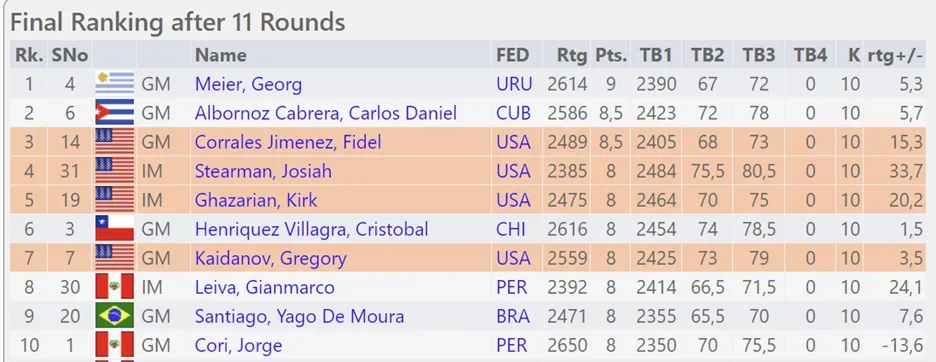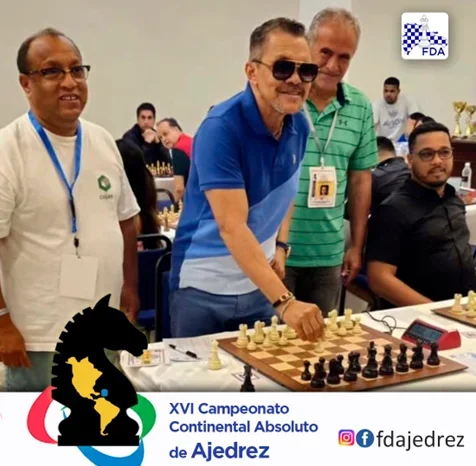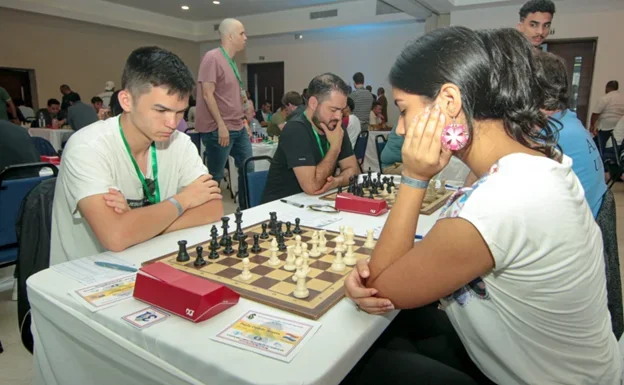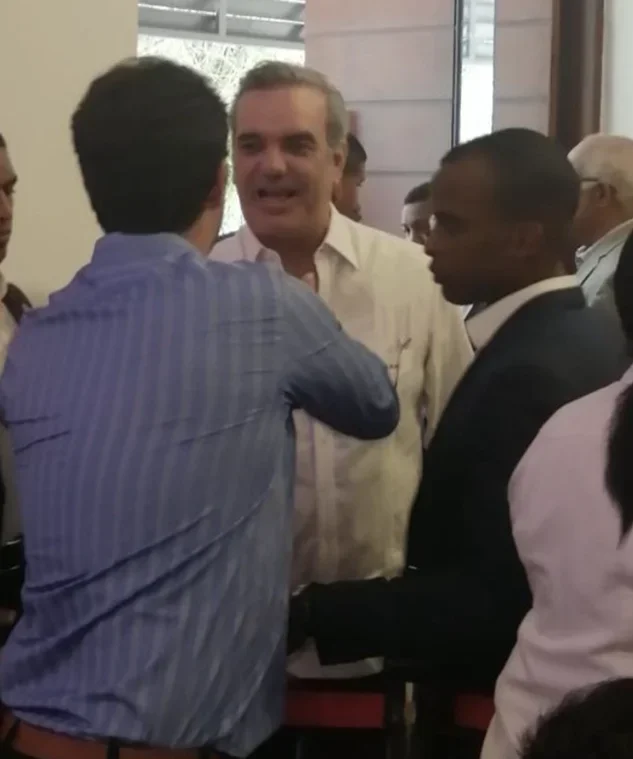JUAN DOLIO, DOMINICAN REPUBLIC - Disco music filled the small conference center as the audience impatiently munched on dried macarons and downed tropical-colored fruit punch, all breathlessly awaiting the arrival of Luis Abinader, president of the Dominican Republic. It’s not often that the president of a country makes a live appearance at an event where most participants are silent! Finally, at 5:21 pm, the organizers decided to start the tournament—one hour and twenty-one minutes late, with no sign of the president.
While politics and chess are not known to intermingle, President Abinader was a frequent topic of discussion at the XVI American Continental Championships. Over 160 chess players representing 24 countries across North and South America descended upon the Emotions by Hodelpa resort in Juan Dolio, Dominican Republic, each vying for the four coveted qualification spots for the World Cup, one of the most prestigious tournaments on the professional chess circuit.
GM Georg Meier, representing Uruguay, won the event (and first qualification spot) outright with a fantastic 9/11 performance. By the tournament’s end, Americans managed to capture the three remaining qualification spots, truly an extraordinary and unprecedented feat! As GMs Carlos Albornoz and Cristobal Henriquez Villagra had previously qualified through their respective Zonal tournaments, IM Kirk Ghazarian was able to join GM Fidel Corrales and IM Josiah Stearman to grab the fourth qualification spot. Unfortunately, Ghazarian is unable to play and the next eligible player (after GM Gregory Kaidanov, who already qualified last year) is IM Gianmarco Leiva.

On top of qualifying for the World Cup, both Stearman and Ghazarian earned GM norms with two rounds to spare. On his way to earning the norm, Stearman played eight consecutive GMs, scoring an impressive four wins and three draws. Meanwhile, Ghazarian was a stalwart throughout the entire tournament, remaining undefeated and holding draws against the six GMs he faced. After round nine, I saw Ghazarian talking to the chief arbiter, thanking her, and cordially shaking hands. In the moment, I thought he had withdrawn after securing his norm — perhaps because he might not have known that norms, once achieved, cannot be taken away. At dinner, I asked if he had dropped out to which he laughed and replied that he was merely ascertaining that he had met the requirements for a GM norm. Embarrassing on my part!
To make up for the president’s absence on the first day, organizers invited renowned Dominican merengue artist Rafa Rosario to offer some comments and make the ceremonial first move in round three. Funnily enough, my opponent (who snuck into the photo below) and I were seated right next to the board where the merengue master made his move. Rosario’s advice? “For the winners, congratulations; for the losers, I guess you get to enjoy the Dominican Republic.” I was there on a mission, so thankfully I did not get to enjoy the Dominican Republic, yet. However, I did learn from my opponent after the game that the Dominican Republic produces a variety of sweet fruits; in the south of the country where he was from, mangoes are so plentiful that there is a dedicated Mango Fair where fairgoers can try up to 50 different types of mangoes!

The critical battle between the leading Americans came during round four, where after holding a solid draw against Cuban GM Carlos Albornoz the previous day, Stearman faced GM Corrales. At the time, neither player knew that they would eventually earn a qualification spot, leading to an intense and complex fight. Here is the full recap of their game:

After the game, I had the distinct pleasure of listening to the players’ analysis of the game with fellow American IM Alex Ostrovskiy. By all accounts, this game proved key for Stearman and set off the positive momentum that carried him through the tournament, as he entered round five on a remarkable 4½/5! For his part, Corrales took the loss in stride and doubled down to power through the next games.
Round five was a fiercely contested round, with IM Ghazarian facing his first tough challenge with the black pieces against GM Albornoz. Despite teetering on the brink at moments in the game, Ghazarian managed to turn the tides after capitalizing on Albornoz’s inaccuracies. After an intense, up-and-down game, Ghazarian earned his second draw against a strong GM, with Black no less, reaffirming his solid reputation and propelling him into the victors' tier in the pairings.
The round also hosted an interesting happenstance, where Peruvian IM Deysi Cori faced off against fellow Peruvian GM Jorge Cori. In chess, it is not uncommon for players to share last names, especially if they are from the same country. But this battle was different, and a bit more personal: after a tense and dramatic game, Deysi emerged victorious over her younger brother in the Cori vs. Cori battle! Upping the stakes in their sibling rivalry, Deysi was aiming to earn a GM norm while Jorge was seeking to qualify for the World Cup.
Unfortunately, both Coris came up just short, with Jorge finishing in a tie for fourth place with 8/10 and missing out on qualifications by tiebreaks. Deysi finished just outside the top ten as the top player with 7½/11, but not did not earn a norm. Interestingly enough, while Deysi just claimed her IM title this year, she’s earned a whopping 14 IM norms over her career.
Prior to the start of round six, players were greeted by a metal detector wand screening. At first, I assumed the organizers were beefing up anti-cheating measures; had Magnus tweeted something? However, the true purpose soon became clear: the presence of the Dominican Republic’s armed forces stationed at regular intervals on and around the hotel property signaled that the president was due to arrive again, on a double-round day. Recognizing the imminent delay, many players retreated to their rooms for further preparation or air-conditioned privacy or sunbathed on the reclining pool chairs a short walk from the playing hall. Yet, when President Abinader finally arrived at 12:30 pm, more than 1½ hours after the scheduled start of the round, he was greeted with a standing ovation and the flashes of a swarm of cameras as supporters rushed to share the frame with him. After delivering a short but inspiring speech on the future of chess in the Dominican Republic, President Abinader and his entourage made his way out, but not before GM Corrales, speaking in Spanish, was able to introduce himself and snap a photo with him!

As a high school student, I discovered that a presidential visit instantly makes the rounds at home. Upon my return, it seemed everyone was asking, “Did you get to meet the president? Did you take a photo with him?” Unfortunately, I had left my phone in the hotel room, anticipating that the round would start shortly after the president finished delivering his remarks. Immediately following his exit, the main arbiter presented us with two options: play the round in ten minutes or postpone the round to the standard 4:30 pm start time and shift the second round of the day to Sunday. A slightly raucous but near-unanimous voice vote confirmed the players’ preference for the latter.
Although this development seemed beneficial for most, I was ready for the game and not looking forward to more time to worry about preparation! Perhaps the schedule shift disrupted my psyche — I had a disappointing draw later that day followed by a shaky win in round seven. However, just as I was climbing up the standings, I lost my round eight game in unspeakably tremendous fashion. It has not been annotated, but I will let the game and its conclusion speak for itself. Needless to say, this took the steam out of my otherwise solid tournament thus far.
Despite my personal setbacks, I was still happy to see tournament leaders Stearman and Ghazarian were consistently dominating the top of the standings, while Corrales had spent several rounds flying under the radar. Yet, his round four game against Stearman marked a turning point; he excelled with a 7/8 score in the subsequent rounds, only giving up two draws! Out of all the American players at the tournament, his games were by far the most tactical and led to the most dynamic and unbalanced positions. True to his style, Corrales was able to vault himself back into contention with a pair of spectacular wins against Colombian GMs David Arenas and Santiago Avila Pavas in rounds eight and nine respectively:
Going into the final rounds, the tension in the air was palpable. Yet, despite the pressure and allure of being so close to such a coveted goal, the American delegation shared many collegial moments, dining, playing basketball, and swimming together. Indeed, who’s one to not enjoy the Dominican Republic?
After one final hiccup, with Stearman narrowly escaping with a draw against Peruvian IM Gianmarco Leiva, the results rolled in: Corrales won his final game, taking third on tiebreaks, while Stearman led the seven-way tie of players finishing with 8/11. However, as the first tiebreak was the average rating of the opposition, Stearman clinched his qualification spot as he faced the toughest opposition in the tournament, with an average of 2484; Ghazarian’s average opposition was just below him at 2464.
As I savored my mango drink while playing ping pong with my phone case and practicing my Spanish with the other young players, I was happy to celebrate and savor the victories of my compatriots.”
Categories
Archives
- January 2026 (2)
- December 2025 (27)
- November 2025 (29)
- October 2025 (39)
- September 2025 (27)
- August 2025 (29)
- July 2025 (43)
- June 2025 (25)
- May 2025 (24)
- April 2025 (29)
- March 2025 (29)
- February 2025 (20)
- January 2025 (24)
- December 2024 (34)
- November 2024 (18)
- October 2024 (35)
- September 2024 (23)
- August 2024 (27)
- July 2024 (44)
- June 2024 (27)
- May 2024 (31)
- April 2024 (51)
- March 2024 (34)
- February 2024 (25)
- January 2024 (26)
- December 2023 (29)
- November 2023 (26)
- October 2023 (37)
- September 2023 (27)
- August 2023 (37)
- July 2023 (47)
- June 2023 (33)
- May 2023 (37)
- April 2023 (45)
- March 2023 (37)
- February 2023 (28)
- January 2023 (31)
- December 2022 (23)
- November 2022 (32)
- October 2022 (31)
- September 2022 (19)
- August 2022 (39)
- July 2022 (32)
- June 2022 (35)
- May 2022 (21)
- April 2022 (31)
- March 2022 (33)
- February 2022 (21)
- January 2022 (27)
- December 2021 (36)
- November 2021 (34)
- October 2021 (25)
- September 2021 (25)
- August 2021 (41)
- July 2021 (36)
- June 2021 (29)
- May 2021 (29)
- April 2021 (31)
- March 2021 (33)
- February 2021 (28)
- January 2021 (29)
- December 2020 (38)
- November 2020 (40)
- October 2020 (41)
- September 2020 (35)
- August 2020 (38)
- July 2020 (36)
- June 2020 (46)
- May 2020 (42)
- April 2020 (37)
- March 2020 (60)
- February 2020 (38)
- January 2020 (45)
- December 2019 (34)
- November 2019 (35)
- October 2019 (42)
- September 2019 (45)
- August 2019 (56)
- July 2019 (44)
- June 2019 (35)
- May 2019 (40)
- April 2019 (48)
- March 2019 (61)
- February 2019 (39)
- January 2019 (30)
- December 2018 (29)
- November 2018 (51)
- October 2018 (45)
- September 2018 (29)
- August 2018 (49)
- July 2018 (35)
- June 2018 (31)
- May 2018 (39)
- April 2018 (31)
- March 2018 (26)
- February 2018 (33)
- January 2018 (30)
- December 2017 (26)
- November 2017 (24)
- October 2017 (30)
- September 2017 (30)
- August 2017 (31)
- July 2017 (28)
- June 2017 (32)
- May 2017 (26)
- April 2017 (37)
- March 2017 (28)
- February 2017 (30)
- January 2017 (27)
- December 2016 (29)
- November 2016 (24)
- October 2016 (32)
- September 2016 (31)
- August 2016 (27)
- July 2016 (24)
- June 2016 (26)
- May 2016 (19)
- April 2016 (30)
- March 2016 (36)
- February 2016 (28)
- January 2016 (32)
- December 2015 (26)
- November 2015 (23)
- October 2015 (16)
- September 2015 (28)
- August 2015 (28)
- July 2015 (6)
- June 2015 (1)
- May 2015 (2)
- April 2015 (1)
- February 2015 (3)
- January 2015 (1)
- December 2014 (1)
- July 2010 (1)
- October 1991 (1)
- August 1989 (1)
- January 1988 (1)
- December 1983 (1)







